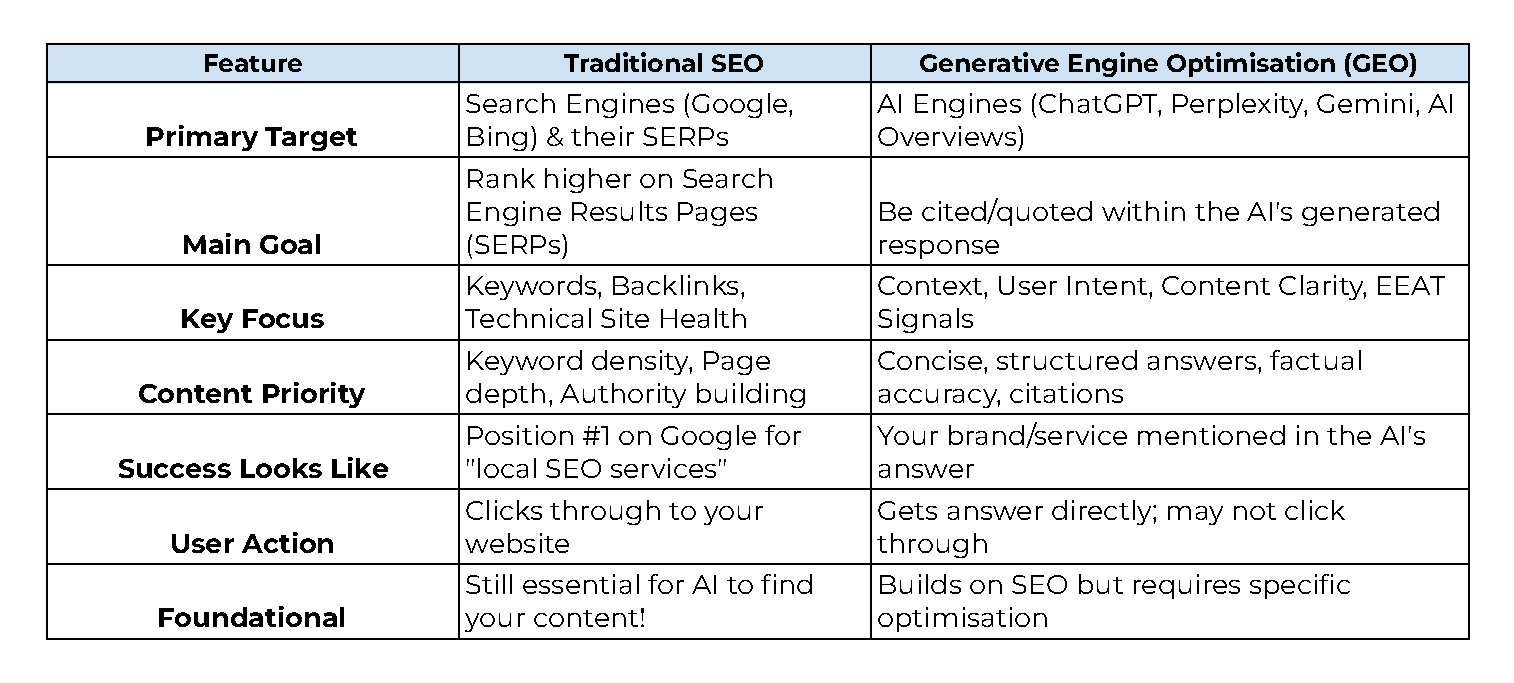Generative Engine Optimization (GEO): Rewriting SEO Rules (And What Your Business Needs to Do)
Hold onto your hats, business owners. If you’ve been sweating over Google rankings and keyword stuffers, there’s a new player in town changing the digital marketing game: Generative Engine Optimisation (GEO). Forget just climbing search results pages; GEO is about making sure your brand is the answer AI gives. Intrigued? You should be.
What on Earth is GEO? It’s Not Just Another Acronym!
Let’s cut through the jargon. Generative Engine Optimisation (GEO) is the art of tweaking your content so AI platforms like ChatGPT, Perplexity, Google’s AI Overviews, or Gemini actually cite you when answering user questions.
Think about it: when someone asks an AI assistant, "What’s the best local bakery in Sydney for gluten-free options?" or "Find me a handyman service that specializes in home renovations," the response can be much more relevant and helpful. Focusing on the specific needs of the client’s industry or preferences ensures they receive tailored recommendations that truly match what they're looking for in their local area. You want your business name, expertise, and link popping up in that instant answer. That’s GEO’s mission.
Unlike traditional SEO services, which focus on ranking your page on Google, GEO ensures your information is pulled directly into the AI’s response, often without the user ever clicking a link. It’s about being the source, not just the destination.
Why Generative Engine Optimization (GEO)? Because Your Customers Aren't Searching Like They Used To
Here’s the wake-up call: 31% of Gen Z already bypass Google entirely, heading straight to AI tools for answers. Globally, platforms like ChatGPT handle a staggering 37.5 million queries daily – and that number’s exploding. Gartner predicts traditional search volume could drop by 25% by 2026. Ignoring this shift? That’s like ignoring Google in 2005.
Users Crave Conversation, Not Clicks: People want direct, helpful answers fast. They’re asking longer, natural questions ("web design company for small cafes near me with online booking") not just typing "web design services". AI delivers concise summaries, and GEO makes sure your info is included.
Zero-Click Searches are Skyrocketing: Over 60% of searches now end without a click to a website. If your content isn’t structured for AI to easily grab and cite, you’re invisible in these interactions.
Trust Shifts to the AI: When ChatGPT names your professional SEO services as a top solution, it carries an implied endorsement. GEO builds this crucial AI-powered authority.
GEO vs. Traditional SEO: Spot the Difference
Confusing GEO with your standard SEO service is easy. They’re related, but fundamentally different beasts. Here’s the lowdown:
Crucially, GEO doesn’t kill SEO. You still need strong SEO services company fundamentals – AI engines often pull data from well-optimised, high-ranking web pages. Think of GEO as the next layer, optimising how your already-discoverable content is understood and used by generative AI.
Gearing Up for GEO: Actionable Steps for Your Businesses
Ready to make your mark in the AI landscape? Here’s how to start weaving GEO into your strategy:
Content is (Still) King, But Structure is Queen: Ditch fluff. Create clear, authoritative, and concise information answering specific user questions. Use bullet points, short paragraphs, clear headings (H2s, H3s), and defined summaries. Ask yourself: "Could an AI easily pull a direct quote or stat from this?".
Double Down on EEAT: Expertise, Experience, Authoritativeness, and Trustworthiness aren’t just SEO buzzwords anymore; they’re GEO gold. Showcase credentials, author bios with real expertise, case studies, customer testimonials, and legitimate backlinks. AI engines prioritise trustworthy sources.
Master Structured Data (Schema Markup): This code helps all search engines understand your content. For GEO, it’s vital. Implement schema for your business (LocalBusiness), products/services, reviews, FAQs, and authors. This gives AI clear signals about what your content is and why it’s relevant.
Think Entities, Not Just Keywords: AI understands concepts and relationships (entities) – e.g., your web design agency + "Brisbane" + "e-commerce" + "user-friendly". Weave context naturally. Answer the why and how, not just the what.
Local GEO is Your Friend: For local SEO services and brick-and-mortar businesses (like your web design company), ensure your Google Business Profile is flawless and integrated with your site. Local citations, reviews, and location-specific content are powerful GEO signals for AI answering "near me" queries.
Optimise for Conversational Queries: Use tools like AnswerThePublic or AlsoAsked to find long-tail, question-based queries real people use ("How much does custom web design usually cost in Melbourne?"). Create content that directly answers these.
Track (What You Can): GEO measurement is evolving. Monitor referral traffic from known AI platforms (e.g., ChatGPT, Perplexity) in Google Analytics. Some white label SEO services and specialised tools (like AthenaHQ, Profound) are emerging to track brand mentions within AI responses.
The Time for GEO is Now: Don't Get Left Behind
The shift towards AI-powered search isn't coming; it's happening right now. Relying solely on traditional SEO service tactics is like polishing the brass on the Titanic. GEO represents the crucial evolution needed to stay visible where your audience is increasingly looking: inside AI-generated answers.
For Australian businesses – whether you offer local SEO services, run a slick web design agency, or provide any professional service – understanding and implementing GEO fundamentals is no longer optional for future-proofing your visibility. It’s about ensuring your brand isn't just found but is framed as the trusted answer when potential customers ask.
The algorithms are learning. Is your content teaching them the right things about you? Partnering with forward-thinking professional SEO services or a tech-savvy web design company that grasps this shift is a smart first move into the generative future. Get started, get structured, and get cited.



